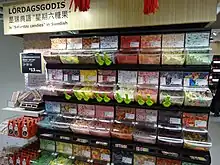Lördagsgodis
Lördagsgodis (English: "Saturday sweets" or "Saturday candy") is a Swedish tradition of children eating candy or sweets mainly or only on Saturdays.[1]
The tradition started as a health recommendation in 1959[2] following the government-funded Vipeholm experiments, where patients of Vipeholm Hospital for the intellectually disabled in Lund, Sweden, were unknowingly fed large amounts of sweets to see whether a high-sugar diet would cause tooth decay.[3]
Over time, what was once a recommendation has turned into a routine for both children and adults to eat candy on Saturdays, as an event to look forward to during the week.[4] It is common for Swedes to buy lördagsgodis by weight from candy walls in grocery stores.[5]
References
- Savage, Maddy (8 October 2021). "Lördagsgodis: Sweden's Saturday-only candy tradition". BBC. Retrieved 2 January 2023.
- Kawash, Samira (2013). Candy: A Century of Panic and Pleasure. New York: Faber & Faber, Incorporated. pp. 257–258. ISBN 9780865477568.
- Lundqvist, Ida (5 December 2010). "Vipeholmsexperimenten" [Vipeholm experiments]. P3 Dokumentär (in Swedish). Sveriges Radio.
- "Sweet only on Saturday: the Swedish tradition that teaches children the things of life". The European Times. 26 August 2022. Retrieved 27 January 2023.
- Ogletree, Kelsey. "Lördagsgodis Is Sweden's Sweet Tradition of Eating Candy on Saturdays, and We're Officially Obsessed". realsimple.com. Real Simple. Retrieved 27 January 2023.
This article is issued from Wikipedia. The text is licensed under Creative Commons - Attribution - Sharealike. Additional terms may apply for the media files.
